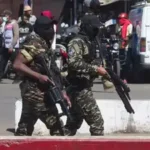The government of Mali has announced the imposition of retaliatory visa bond fees on United States, U.S citizens seeking entry into the West African nation.
The move is a direct response to a new U.S pilot program requiring Malian citizens to post a substantial refundable bond for certain visitor visas.
The Malian Foreign Ministry stated on Sunday that the decision to impose a retaliatory visa bond fees on U.S citizens was made “in application of reciprocity”
The Malian government is now demanding that U.S nationals seeking B-1/B-2 tourist or business visas pay an identical bond amount to that imposed on Malians by the United States.
This means American citizens traveling to Mali for tourism or business purposes will now face bond requirements of up to $10,000, depending on the consular determination.
This mirrors the up to $10,000 bond requirement the U.S State Department has set for Malian visa applicants as part of its one-year pilot program, intended to curb visa overstays.
Mali also accused the U.S government of allegedly breaching a 2005 accord guaranteeing long-term visa access between the two nations.
In a statement released by its Foreign Ministry, Mali said it “has always collaborated with the United States of America in the fight against irregular immigration, with respect for law and human dignity”.
The statement reads: “The Ministry of Foreign Affairs and International Cooperation of the Republic of Mali has taken note of the implementation by the United States of America, starting from October 23, 2025, of a pilot visa bond program for Malian nationals eligible for a business or tourism visa of types B-1/B-2, and the payment of a bond of five thousand (5,000) or ten thousand (10,000) American dollars for the issuance of said visa.
“The Ministry, while taking formal note of this measure, deplores the unilateral decision of the American Government which undermines the provisions of the Agreement relating to the establishment of the long-term multiple-entry visa between the two States, which entered into force on April 14, 2005.
“In application of reciprocity, Mali decides to establish an identical visa program, imposing the same conditions and requirements on American nationals as those applied to Malian citizens.
“The Ministry recalls that Mali has always cooperated with the United States of America in the fight against irregular immigration, in respect of the law and human dignity.
“Finally, the Ministry of Foreign Affairs and International Cooperation reaffirms the commitment of the Government of Mali to promote fruitful cooperation relations with the United States of America within the framework of dialogue and mutual respect.”
Pan-Atlantic Kompass reports that the decision of the Malian government to impose retaliatory visa bond fees against U.S. citizens has indicated escalating tensions as the administration of U.S President Donald Trump is reportedly deploying visa restrictions as diplomatic leverage to pressure African governments on immigration enforcement and deportation cooperation.
Mali is among seven African countries facing the bond requirements under a year-long pilot scheme that the US State Department says targets nations with high visa overstay rates.
Mauritania, Sao Tome and Principe, and Tanzania were also added to the programme alongside Mali in late October, while Gambia, Malawi, and Zambia were added earlier.
Travellers subject to the bonds must pay up front through a U.S Treasury Department portal, and can only enter and exit the US through three designated airports.
The money is refunded if visitors depart on time, but forfeited for overstays or asylum applications. Consular officers determine individual bond amounts based on applicants’ circumstances.
The U.S justified the pilot by citing national security concerns and U.S Department of Homeland Security data showing more than 300,000 business and tourist visa holders overstayed their authorized periods in 2023.
However, it appears that the visa bonds are the latest immigration measure following months of efforts by the Trump administration to pressure African nations into accepting deportees, including those not from their own countries.
Several governments have received expelled migrants in exchange for payments or political favours, while others faced swift punishment for refusal.
Burkina Faso had all visa services suspended at its U.S Embassy after rejecting demands to accept third-country deportees, forcing residents to travel to neighbouring Togo for applications.
South Sudan initially had visas for all passport holders revoked following a deportation dispute, though it later accepted eight people from Asian and Latin American countries.
Eswatini agreed to receive up to 160 deportees for $5.1m in U.S funding, while Ghana, Rwanda, and Uganda have also accepted expelled migrants under bilateral arrangements.





